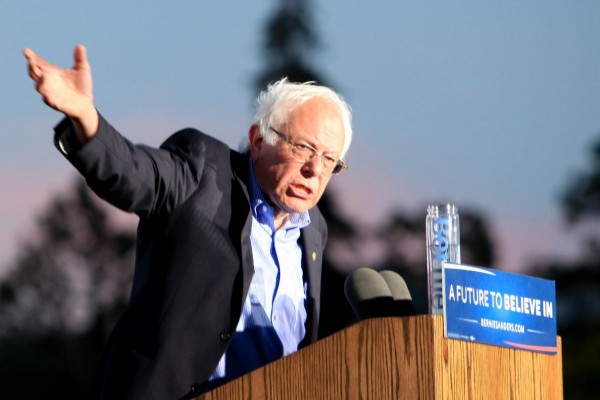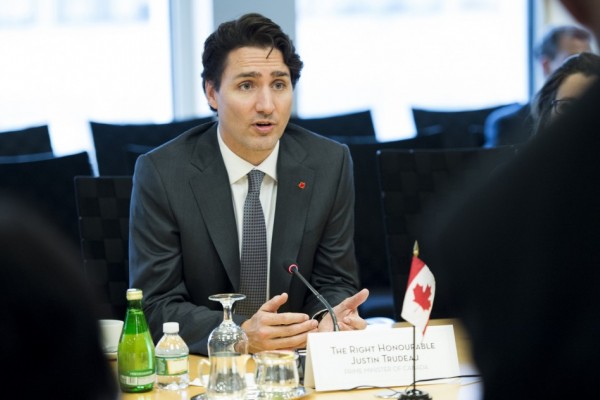Jagmeet Singh was right to call for Trump’s impeachment

Federal NDP Leader Jagmeet Singh was right to take a stand in favour of Donald Trump’s impeachment, says Christo Aivalis. Image by Canadian Dimension, adapted from a photo by Tyler Merbler/Flickr.
Donald Trump has made history. He is the only president in American history to be impeached twice. His incitement of supporters to launch a deadly insurrection at the United States Capitol building was a shocking and horrific act. The world is better with him on his way of out of power, whatever the deep limitations of Joe Biden.
Canadians have surely watched these events from a distance with sadness and dismay. But there was one major Canadian party leader who took a stand in favour of Trump’s impeachment in 2019: NDP leader Jagmeet Singh. Despite criticisms from Liberals and Conservatives that it was inappropriate for a Canadian politician to question a president’s legitimacy—or that such actions endangered the Canadian economy—Singh has been proven unequivocally correct by the passage of recent history.
If we flash back to the 2019 federal election, Singh was asked if Trump should be impeached, and did not equivocate: “I hope he gets impeached before I get to speak to him,” Singh said, when asked how he would hypothetically operate vis-à-vis a Trump administration. He followed it up the next day by saying he “wasn’t joking” and reiterated that Trump posed a danger in our corner of the globe and across it. He had a responsibility to air this fact given his platform.
Upon saying this, there was an uproar in the media, and from among many rank-and-file partisans of the neoliberal parties. Their arguments were threefold, and none of them all that convincing. First was that it was inappropriate to comment on elections taking place within a foreign nation. This was curious, because it came from many typical Liberal supporters who cheered on Trudeau’s endorsement from Barack Obama whilst in the thick of the blackface scandal (not to mention the government’s blatant meddlesomeness in foreign elections from Venezuela to Bolivia). But beyond this, it should not be controversial for a Canadian leader to openly desire a political outcome in a nation that has such resonant social, political, environmental, and economic relevance to the daily lives and destiny of Canadians. Saying Trump should go must be the very baseline for anyone professing a progressive vision for this continent and the world.
The second argument was that Singh—as the leader of a smaller party—could say such things because of his and the NDP’s irrelevance, meaning that only his invisibility gave him cause to be brave, whereas Trudeau had to sit across from Trump at many an event. While this may play some role, the reality is that Trudeau was more than tactful when approaching Trump: he was downright deferential. He refused to address Trump’s refugee policies in any meaningful way—such as cancelling the safe third country agreement—and he could only muster seconds of silence in response to Trump’s naked assault on racial justice and civil liberties this past summer, something civil rights icon Al Sharpton was correct to point out: “The time has made the moment of change in America. And I’m going to express that in my eulogy. And since you’re from Canada, I won’t have a 21-second gap before I say what I have to say.”
This is all beyond the fact that the Trump-Trudeau regimes have been a villainous tandem when it comes to their hatred of democratic socialism and Indigenous rights in Latin America. Perhaps Trudeau was more constrained in his ability for plain-speaking, but even if he had the ability, I doubt he would have ever utilized it.
Partially connected, the final argument was that, as a third-party leader, Singh could afford to make these proclamations, but Trudeau had to be coy so as to protect Canada from Trumpian retaliation through measures like tariffs. But not only does this suggest that Canada’s ostensibly progressive prime minister should place dollars over essential human dignity, it also presumes that Trump would be a rational actor if only we weren’t mean to him. And even after Trudeau refused to condemn Trump over a summer of systematic human rights abuses, Trump reimposed tariffs on exports including aluminium. Cowardice here was not even profitable, let alone principled.
Ultimately, Singh and the NDP had it correct: Trump was an objectively dangerous and incompetent leader, and it was dishonest to not inform Canadians of that basic reality, and not demand an outcome that led to his defeat. If one believes that Canada as a good-willed ‘middle power’ has a role to play in promoting global human rights, then at the very least this should include holding ghouls like Trump accountable. If—as progressive congresswoman Cori Bush put it—Trump is little more than the white supremacist in chief, it should not fall solely upon the shoulders of Canada’s first major racialized party leader to demand his ouster. Silence is complicity.
Of course, none of this is to say that Singh is without flaw when it comes to saying difficult, but essential things, about Canada’s global allies. Singh and his NDP caucus were correct to decry the coup against Bolivia’s democratic socialist government in 2019, but could be more strident and vocal allies of the left within the global south. And most of all, the NDP and Singh in particular could say much more with regard to Israel’s rampant human rights abuses within its 21st century apartheid regime. Silence here, too, is complicity.
Nonetheless, when it came to Trump, Singh has only been proven more correct with the passing of time. Canadians should remember this.
Christo Aivalis is political writer and commentator with a PhD in History. His work has appeared in the Washington Post, Globe and Mail, Maclean’s, and Passage. He can be found daily on YouTube.










